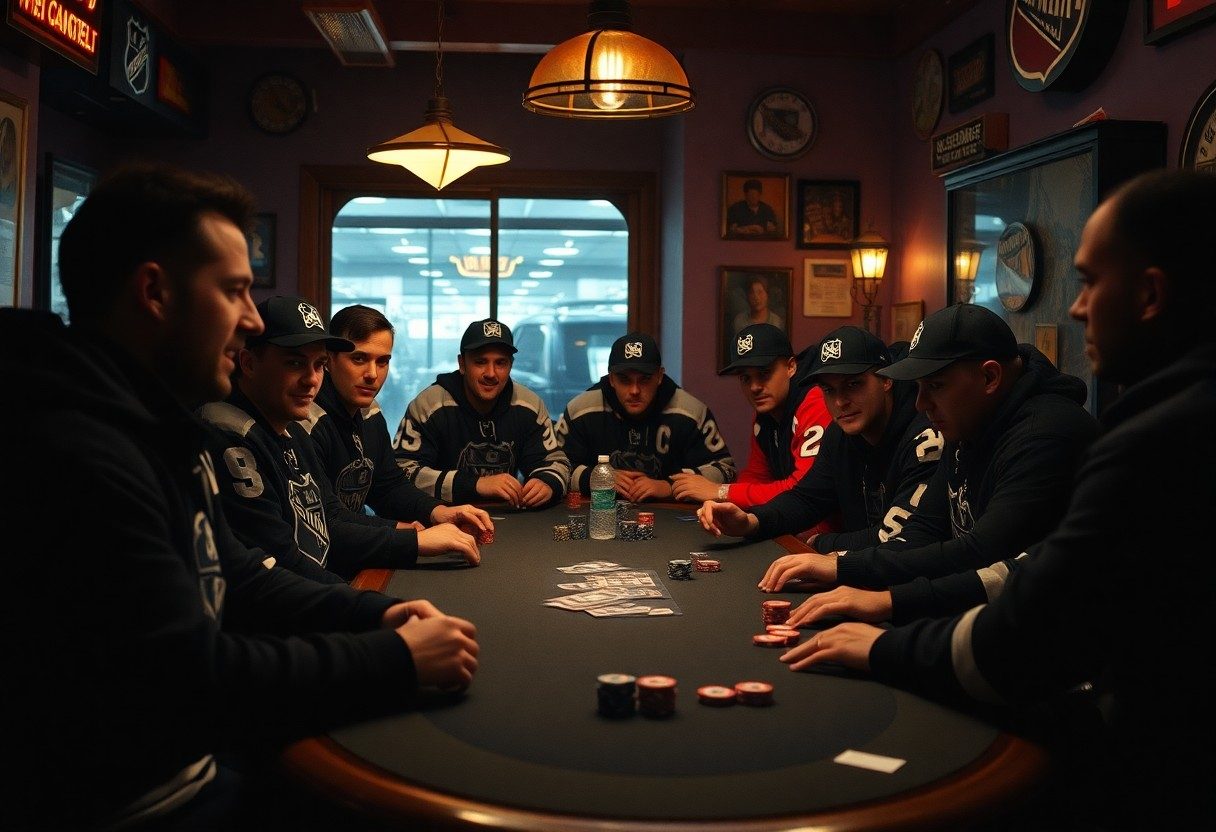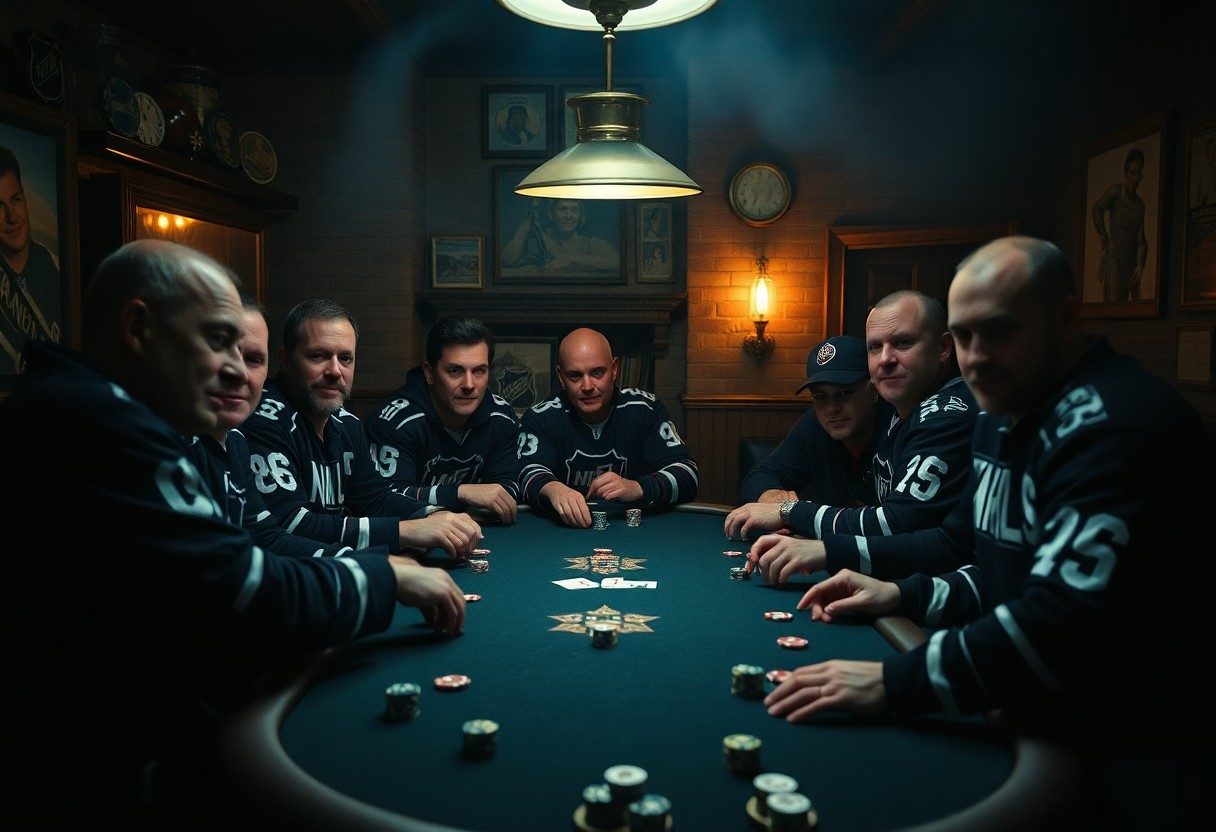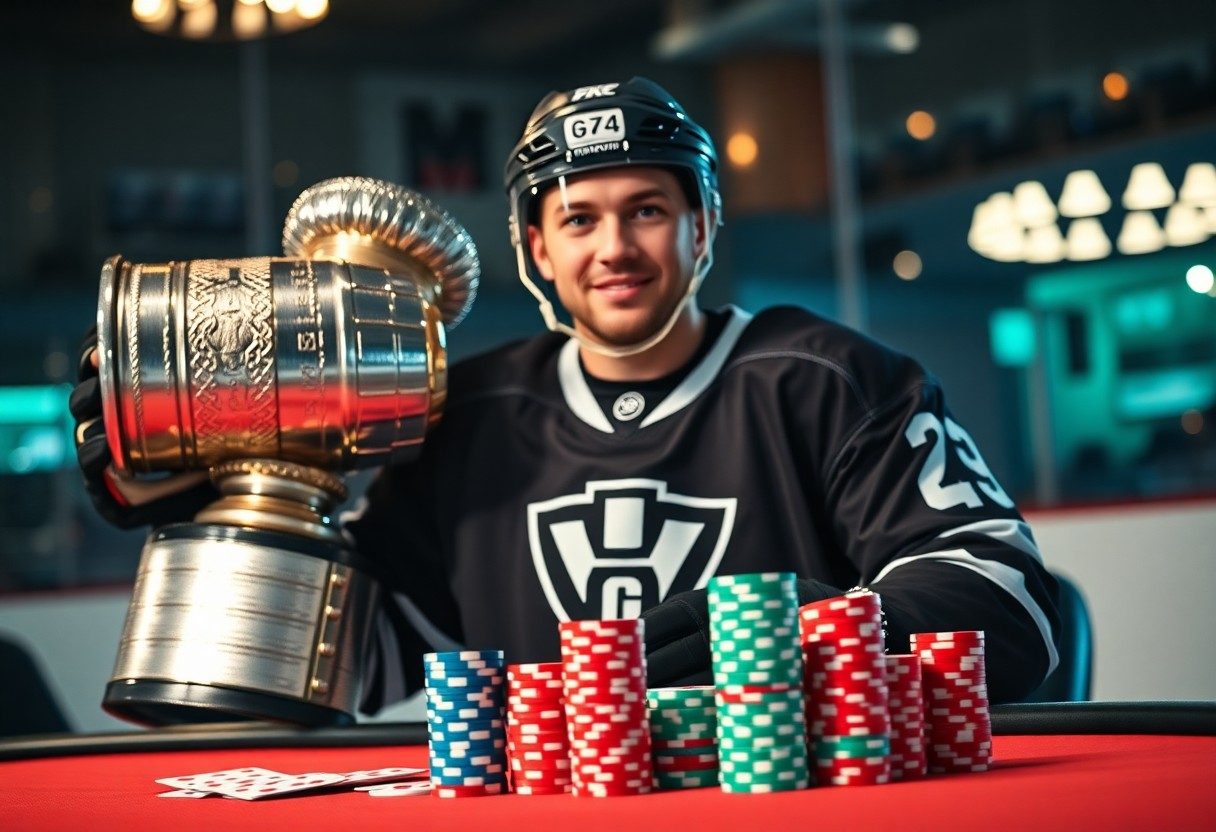Poker is not just a game of chance; it’s also a favorite pastime for many NHL players off the ice. If you’re curious about which hockey stars enjoy testing their luck and strategy at the poker tables, you’ve come to the right place. This guide will unveil some of the NHL’s most notable players who have a passion for poker, showcasing their stories and experiences. Whether you’re a poker enthusiast or a die-hard hockey fan, you’ll gain insights into how these athletes balance their competitive spirits on and off the rink.
Types of Poker Games Popular Among NHL Players
To engage with the thrill of the game, NHL players often gravitate towards various poker formats. Here’s a breakdown of the most popular types:
| Texas Hold’em | Omaha High |
| Seven Card Stud | Five Card Draw |
| High-Low Split | Razz |
Any poker night with NHL stars will likely feature these games, showcasing their skills and strategies.
Texas Hold’em
Popular among both amateurs and professionals, Texas Hold’em is the go-to game for many NHL players. The blend of strategy and luck, combined with the ability to read opponents, keeps players engaged and competitive at the tables.
Omaha High
While Texas Hold’em reigns supreme, Omaha High is also a favorite. This variant requires you to use two of your four hole cards and three of the five community cards to form the best hand, leading to dynamic gameplay.
Understanding the complexities of Omaha High can elevate your poker strategy. With more cards in hand, the possibilities for strong hands increase. As a player, you must adapt your tactics, particularly in predicting opponents’ hands and maximizing your chances to win big pots.
Seven Card Stud
To dive deeper into another engaging option, Seven Card Stud doesn’t utilize community cards. Instead, each player receives their own set of cards, creating a unique dynamic that requires keen observational skills and incredible memory.
A key aspect of Seven Card Stud is the necessity of tracking opponents’ exposed cards while also leveraging your private information effectively. The absence of community cards means that forming a strong hand relies solely on your ability to assess and predict the outcomes based on your draws and betting strategies.
Tips for Playing Poker Like an NHL Star
Any aspiring poker player looking to channel their inner NHL star should focus on mastering a few key skills. Consider the following strategies:
- Practice discipline and patience.
- Manage your bankroll wisely.
- Observe your opponents’ patterns.
- Stay calm under pressure.
- Continuously improve your strategies.
Thou can elevate your game with dedication and practice.
Understanding Odds and Probabilities
Playing poker effectively requires a solid grasp of odds and probabilities. Familiarize yourself with pot odds, implied odds, and the probabilities of drawing specific hands. By calculating these factors, you’ll make informed decisions about whether to call, raise, or fold during a game, just like a skilled NHL player weighing their options on the ice.
Reading Your Opponents
Playing poker successfully involves more than just understanding the game; it’s about reading your opponents as well. Pay attention to their betting patterns, body language, and facial expressions to gather insights into their possible hands. Recognizing subtle behavioral cues can inform your decision-making Process and give you an edge over your competitors.
A keen eye for detail helps you assess the strength of your opponents’ hands. Observe how they react to different situations, whether they bluff frequently or play conservatively. By analyzing these tendencies and adapting your strategy, you can exploit their weaknesses, leading to better outcomes in your poker game.

Step-by-Step Guide to Hosting a Poker Night
Keep your poker night stress-free and fun by following these crucial steps. You’ll want to prepare a comfortable environment, gather the right snacks and drinks, and ensure that everyone knows the schedule. Here’s a quick guide to help you set the scene for an exciting evening.
| Step | Description |
| 1 | Choose a date and time that works for everyone. |
| 2 | Gather your supplies: cards, chips, and seating. |
| 3 | Prepare snacks and beverages to keep energy up. |
| 4 | Send out invitations to your selected players. |
| 5 | Set up the poker table and arrange seating positions. |
Setting Up the Game
To create an inviting game atmosphere, set up your poker table in a well-lit area, making sure there’s ample space for players to move. Arrange seating so that everyone is comfortable, and add some style with a nice tablecloth and quality cards. Organize your chips by denomination for easy access during play.
Selecting the Right Players
Selecting the right players can elevate the experience of your poker night. Think about your guest list and choose individuals who share an interest in poker and who will contribute to a spirited, social environment.
Night can guide your choices—look for a mix of skill levels to keep the game enjoyable for everyone. Inviting friends with varied expertise adds excitement, as newer players can learn from seasoned ones, all while keeping the atmosphere fun and engaging.
Establishing Rules and Stakes
Even before the cards are dealt, it’s important to establish clear rules and stakes. Discuss the game format (e.g., Texas Hold’em) and betting structure so everyone is on the same page and confident as the game unfolds.
The stakes should be suitable for all players involved; whether that’s low-stakes for a casual night or higher for a more competitive edge, transparency is key. By setting these parameters early on, you’ll create a fair and enjoyable environment for all players at the table.
Factors That Influence Poker Success
All aspects of poker can influence your success at the tables. Understanding these key factors can significantly improve your game:
- Mental toughness
- Emotional control
- Strategic thinking
- Bankroll management
- Reading opponents
Assume that focusing on these elements will help enhance your overall performance.
Mental Toughness
On the poker table, mental toughness is crucial. It involves staying focused under pressure, maintaining composure during high-stakes situations, and sticking to your game plan regardless of setbacks. This mental resilience allows you to push through challenging hands and avoid making impulsive decisions driven by frustration or eagerness.
Emotional Control
Emotional control is vital for anyone serious about poker. You must manage both your emotions and those of others at the table. Making rational decisions can often be overshadowed by excitement or stress, leading to poor gameplay. By harnessing emotional control, you’ll improve your decision-making and increase your overall success.
Control your reactions to wins and losses to keep a clear mind. If you become overly excited after a big pot, you may lose focus and make blunders. Conversely, if you let frustration cloud your judgment during a bad run, you risk making ill-advised plays. Developing emotional control enables you to navigate these ups and downs effectively.
Strategic Thinking
Thinking strategically is an crucial skill in poker. You should analyze various factors like your opponents’ behaviors, betting patterns, and potential outcomes before making any moves. This level of foresight will help you identify opportunities and make well-informed choices that could tilt the odds in your favor.
Factors such as positioning at the table, the stack sizes involved, and the dynamics between players can guide your strategy. By incorporating strategic thinking into your gameplay, you can adapt and overcome various situations you encounter, ultimately increasing your chances of success at the tables.
Pros and Cons of Playing Poker for NHL Players
Despite the excitement and social aspects of poker, NHL players, like anyone else, weigh the potential benefits against the risks. Here’s a breakdown of the pros and cons of playing poker:
| Pros | Cons |
|---|---|
| Improves strategic thinking | Risk of financial loss |
| Enhances social connections | Potential for addiction |
| Allows for relaxation and fun | Distraction from training |
| Opportunity for big winnings | Can affect reputation |
| Builds patience and discipline | Legal complexities in some regions |
Benefits of the Game
Players often find that poker enhances their cognitive abilities, such as strategic thinking and decision-making under pressure. This experience can mirror high-stakes situations on the ice, allowing you to translate skills from the poker table to your game. Additionally, it’s an excellent way to bond with teammates, creating lasting friendships and community within the sport.
Risks Involved
Some players may overlook the risks associated with poker, such as the potential for financial loss and gambling addiction. While enjoying a casual game can be harmless, it’s important to recognize when it could become a problem.
Plus, the thrill of poker can lead you to play beyond your means, jeopardizing financial stability. The pressure of maintaining a poker persona can also lead to poor decision-making, with distractions affecting your performance on the ice. Balancing your time and emotions related to poker is vital in ensuring that the game remains a fun pastime rather than a detrimental habit. Understanding these risks can help you make informed choices about your poker involvement.
Famous NHL Players Who Are Passionate Poker Players
Once again, the worlds of hockey and poker collide as you explore some of the most famous NHL players who have taken their talents from the ice to the poker table. These athletes showcase their competitive spirit and strategic thinking in a different arena, proving that their skills extend beyond just scoring goals and making saves. You’ll be intrigued to learn how their passion for poker adds an exciting dimension to their off-ice lives.
Player Profiles
While examining these NHL stars, you’ll find that many of them have developed a love for poker that goes beyond mere pastime. From skilled card players to high-stakes competitors, each player has their own unique story of how hockey and poker intersect. Their distinct personalities and approaches to the game make them fascinating figures in both sports.
Notable Achievements in Poker
Any discussion about NHL players and poker must highlight some of the remarkable achievements these athletes have attained at the tables. Many have participated in major tournaments, demonstrating their prowess in a sport unfamiliar to their usual audiences. These achievements serve as a testament to their adaptability and skill in navigating two demanding environments.
Players such as Phil Kessel and Tyler Seguin have made headlines not just for their impressive performances on the ice but also for their success in poker tournaments. Kessel, in particular, has shown an affinity for high-stakes games, often competing against seasoned pros. Meanwhile, Seguin has participated in charity poker events, raising funds while showcasing his talent. These ventures indicate that their competitive drive translates well into poker, where strategy and psychology come into play just as much as skill.
To wrap up
As a reminder, poker night brings together NHL players who share a passion for the game both on the ice and at the tables. You gain an insightful look into the personalities and competitive spirit of your favorite stars as they navigate the intricacies of poker. Such events not only offer thrilling entertainment but also highlight the camaraderie among players outside their usual hockey routines. Whether you’re a fan of the NHL or poker, these moments provide an exciting intersection of sport and strategy that enriches your appreciation for both.













